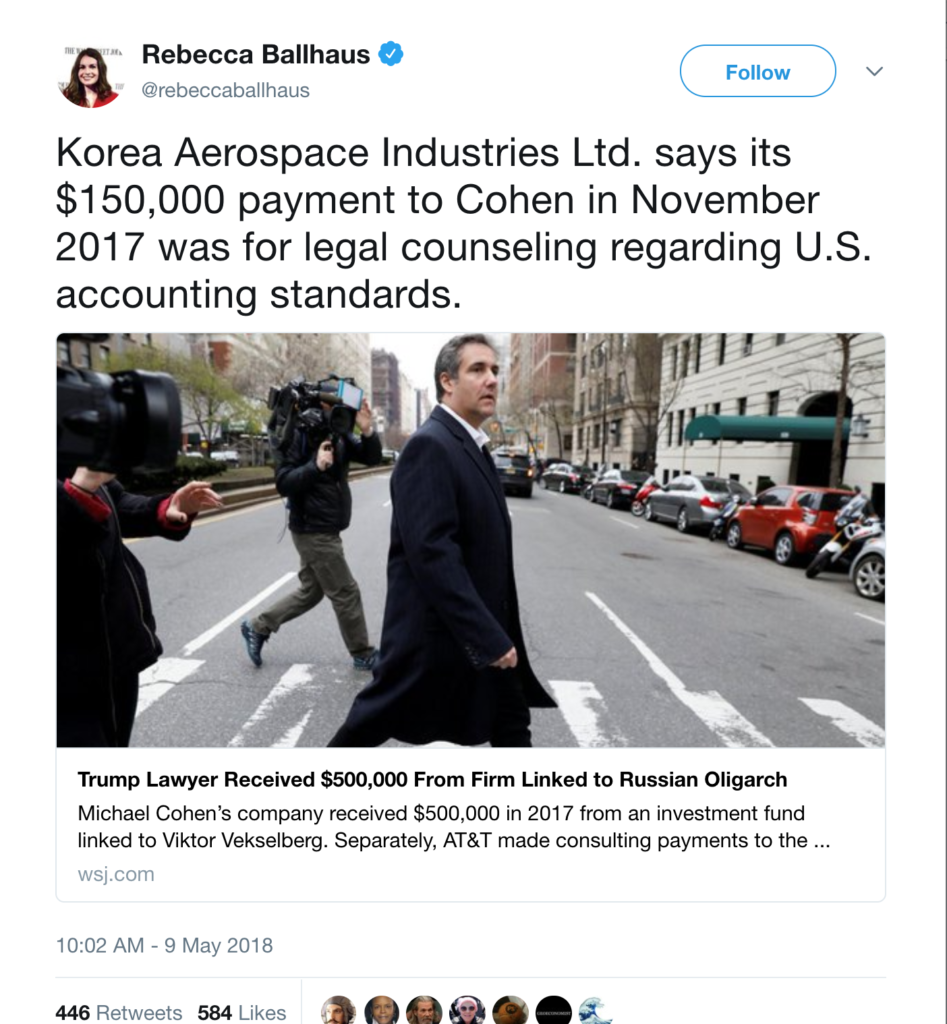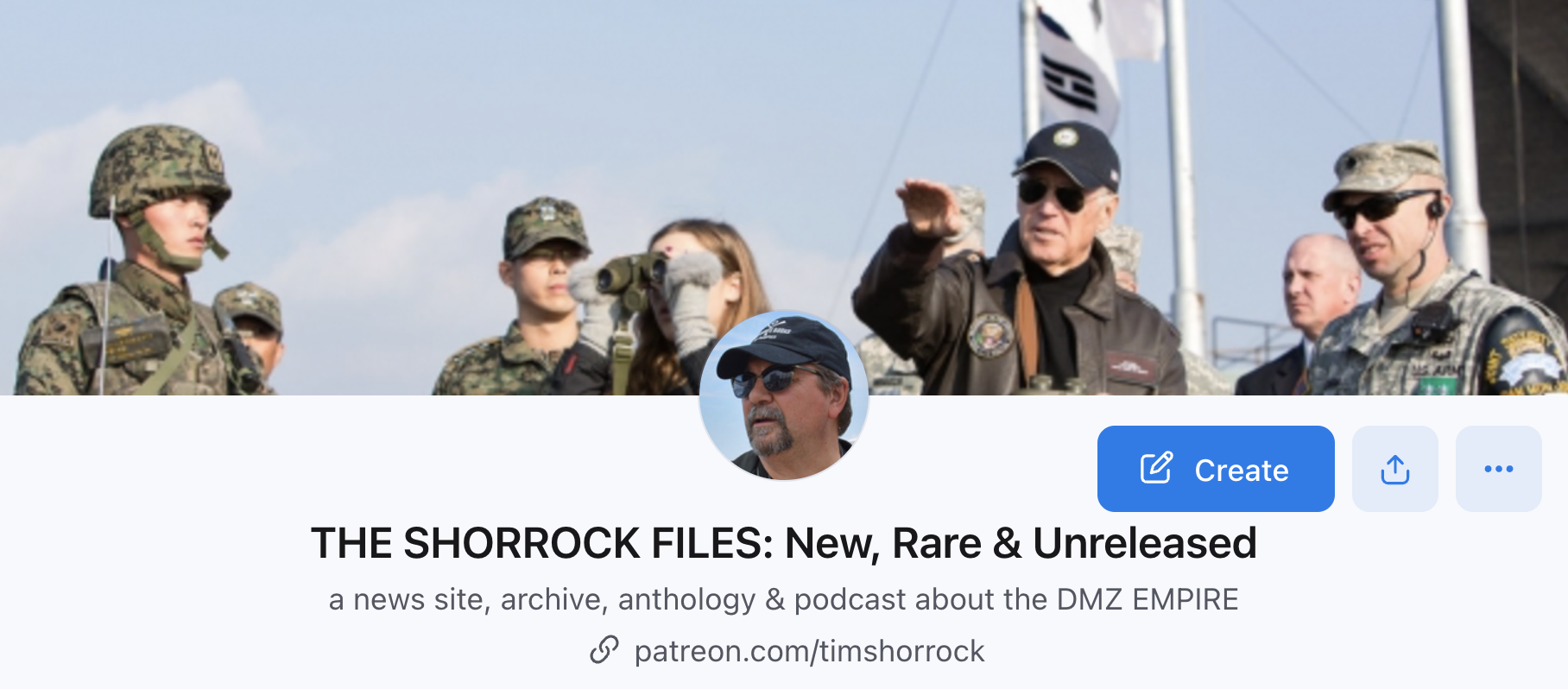Some critical background on KAI’s $150K payment to Trump’s lawyer
So how ridiculous is this?

Here’s the story in the WSJ:
The Avenatti memo also said Korea Aerospace Industries Ltd. made a $150,000 payment to Mr. Cohen in November 2017. Korea Aerospace said it hired Essential for legal counseling regarding U.S. accounting standards.
Hmm. And this is why KAI would need to get close to Trump? Like Trump is going to give a rat’s ass about how a South Korean aircraft manufacturer does its math? No, something else is going on here. And this time, The Washington Post has the story.
The South Korean aviation firm that in November paid $150,000 to a shell company run by Michael Cohen, President Trump’s personal attorney, was at the time embroiled in a major corruption scandal and seeking to land a lucrative defense contract from the U.S. government.
Korea Aerospace Industries said in a statement Wednesday the payment was for advice on matters that included “Cost Accounting Standards,” highly technical bookkeeping rules that would apply to the company’s bid for U.S. defense work. KAI said its contract with the company, Essential Consultants, ended in November.
KAI said Essential Consultants did no legal or lobbying work regarding its bid for the contract. Cohen did not respond to calls seeking comment…
<snip>
In September 2017, two months before the payment to Cohen, former KAI chief executive Ha Seong-yong and another high-ranking company official were arrested on allegations of embezzlement and fraudulently overstating the company’s revenue by a total of $500 million over several years — a development that some industry analysts speculated could hurt the firm’s chances at winning a major contract with the U.S. government.
The company, which is majority-owned by the South Korean government, told South Korean regulators the following month that it was working to increase its “accounting transparencies” and tighten internal auditing to prevent future accounting fraud, documents show.
It’s not clear when or how the firm’s contract with Cohen began or whether his work was related to the accounting scandal. The payment came the same month that Trump visited Moon Jae-in, the president of South Korea, who has publicly backed the aviation company’s efforts to win the U.S. contract.
KAI and U.S.-based defense giant Lockheed Martin have for more than two years been pursuing a $16 billion contract with the U.S. Air Force to provide a fleet of more than 300 training jets.
Last October (2017), I noted that KAI had participated in a forum at the Center for Strategic and International Studies (CSIS), the military think-tank that’s played such a critical role in shaping the Washington Consensus on Korea (it’s the home of Victor Cha, so go figure). In an investigative piece for Newstapa/Korea Center for Investigative Journalism titled “US think tanks play major role in South Korea arms acquisitions,” I reported that the purpose of the CSIS forum was to help iron out problems in US-South Korean military collaboration and specifically benefit KAI.
CSIS has played an important role in shaping US policy in South Korea for decades. But as the South Korean and US militaries have become more integrated in the face of North Korea’s nuclear and missile programs, CSIS has become an important forum where military collaboration – especially on the industrial side – is thrashed out and decided. Its role as a mediator was on vivid display in November 2016, when the center sponsored a conference on “U.S.-Korea Defense Acquisition Policy and the International Security Environment.”
The meeting drew high-level participation from the Park government, including Chang Myoung Jin, Park’s Minister for the Defense Acquisition Program Administration (who was removed from office in July for mismanaging a key export program) and Yi Yong Sic, the then-managing director of Korea Aerospace Industries (KAI). The meeting discussed difficult issues such as industry corruption and differences over US technology transfers. It marked an important step forward in the US-ROK military alliance, CSIS’s CEO John Hamre, a former Deputy Secretary of Defense, said in his opening remarks.
“For most of my professional life, Korea was a place what had to buy from others in order to protect itself,” he said. “We’re now seeing a big transition where Korea is now producing for itself and potentially producing things to sell to us. This is unprecedented…We’ve been military partners for 70 years but we are now going to be business partners in a very new way.”
Specifically, [CSIS CEO and former Deputy Secretary of Defense] John Hamre mentioned the export partnership between Lockheed Martin and KAI on the T-50 Golden Eagle trainer fighter. A year later, despite the shift in South Korea to a progressive government, these relationships have only deepened. The Lockheed-KAI T-50, for example, is now in contention with Boeing and Leonardo DRS for the US Air Force’s next trainer (the award will be made in 2018).
Back to the Post report this morning:
The Pentagon had planned to announce an award of the [KAI] contract in December 2017 but said that month that it was not ready to do so. An Air Force official said Monday that it now expects to award the contract within the next year.
In its statement, KAI said Essential Consultants provided advice on legal and accounting matters.
“KAI received legal counseling service from Essential Consultants LLC to inform reorganization of our (KAI’s) internal accounting system, which also involved several other accounting & professional service providers,” said Oh Sung-keun, deputy senior manager in the company’s public relations department. “EC provided insights into Cost Accounting Standards (CAS) and other accounting standards in the U.S. KAI’s contract with EC ended in November last year, and there hasn’t been any exchange since then.”
Oh said that KAI was unaware of Essential Consultants’ ties to Trump. “In fact, we are somewhat perplexed by these alleged connections that surfaced recently,” Oh said, without elaborating.
Lockheed Martin said in a statement that it was not aware of KAI’s contract with Cohen.
“We have no knowledge of a business relationship between Korea Aerospace Industries and Mr. Cohen, and are not aware of any connection that it may have to the U.S. Air Force Advanced Pilot Training competition,” company spokeswoman Maureen Schumann said of the jet-training contract.
OK then.
